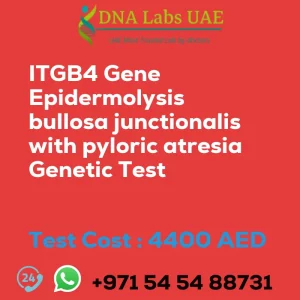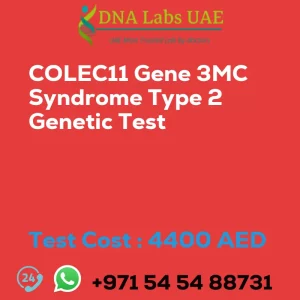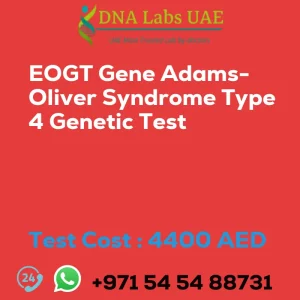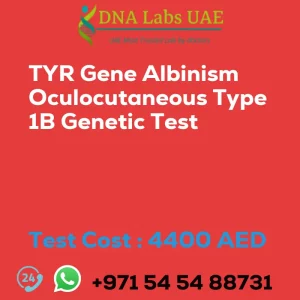HSPG2 Gene Dyssegmental Dysplasia Silverman-Handmaker Type Genetic Test
Genetic testing plays a crucial role in diagnosing and understanding rare genetic disorders. One such disorder is dyssegmental dysplasia, Silverman-Handmaker type, which is associated with the HSPG2 gene. This disorder is characterized by skeletal abnormalities, short stature, abnormal bone development, and joint deformities. It can also affect other parts of the body, including the heart, lungs, and kidneys.
To diagnose dyssegmental dysplasia, Silverman-Handmaker type, a genetic test focusing on the HSPG2 gene is recommended. This test utilizes Next-Generation Sequencing (NGS) technology, which allows for the simultaneous analysis of multiple genes or even the entire genome. By sequencing the HSPG2 gene, variations or mutations that may be causing the disorder can be identified.
The HSPG2 Gene Dyssegmental dysplasia Silverman-Handmaker type Genetic Test is available at DNA Labs UAE. The cost of the test is 4400.0 AED. The sample required for testing can be either blood, extracted DNA, or one drop of blood on an FTA card. The report delivery time is approximately 3 to 4 weeks.
Before undergoing the HSPG2 Gene Dyssegmental dysplasia Silverman-Handmaker type Genetic Test, it is essential to provide the clinical history of the patient and participate in a genetic counseling session. This session helps in drawing a pedigree chart of family members affected by the disorder and provides valuable information for the test.
Consulting with a dermatologist or a healthcare professional specializing in genetics is highly recommended. They can guide you through the benefits, limitations, and potential risks associated with genetic testing. Additionally, they can assist in interpreting the test results, understanding the underlying genetic cause, and providing appropriate genetic counseling and management options for the condition.
Genetic testing plays a significant role in diagnosing and managing genetic disorders. The HSPG2 Gene Dyssegmental dysplasia Silverman-Handmaker type Genetic Test offered by DNA Labs UAE provides valuable insights into the genetic basis of dyssegmental dysplasia, Silverman-Handmaker type. It can help individuals and their families in understanding the condition better and making informed decisions about their healthcare.
| Test Name | HSPG2 Gene Dyssegmental dysplasia Silverman-Handmaker type Genetic Test |
|---|---|
| Components | |
| Price | 4400.0 AED |
| Sample Condition | Blood or Extracted DNA or One drop Blood on FTA Card |
| Report Delivery | 3 to 4 Weeks |
| Method | NGS Technology |
| Test type | Osteology Dermatology Immunology Disorders |
| Doctor | Dermatologist |
| Test Department: | Genetics |
| Pre Test Information | Clinical History of Patient who is going for HSPG2 Gene Dyssegmental dysplasia, Silverman-Handmaker type NGS Genetic DNA Test. A Genetic Counselling session to draw a pedigree chart of family members affected with HSPG2 Gene Dyssegmental dysplasia, Silverman-Handmaker type NGS Genetic DNA Test gene HSPG2 |
| Test Details |
The HSPG2 gene is associated with a rare genetic disorder called dyssegmental dysplasia, Silverman-Handmaker type. This disorder is characterized by skeletal abnormalities, including short stature, abnormal bone development, and joint deformities. It can also affect other parts of the body, such as the heart, lungs, and kidneys. NGS (Next-Generation Sequencing) genetic testing is a type of genetic testing that allows for the simultaneous analysis of multiple genes or even the entire genome. It uses advanced sequencing technology to identify variations or mutations in the DNA sequence. An NGS genetic test for dyssegmental dysplasia, Silverman-Handmaker type would involve sequencing the HSPG2 gene to identify any mutations or variations that may be causing the disorder. This can help in confirming a diagnosis, understanding the underlying genetic cause, and providing information for genetic counseling and management of the condition. It is important to consult with a healthcare professional or a genetic counselor to discuss the benefits, limitations, and potential risks of genetic testing before undergoing any genetic testing procedure. |








